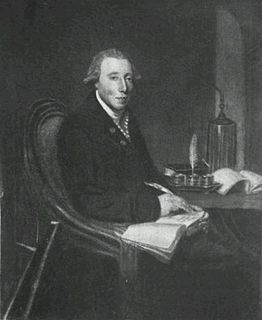A Quote by Thomas Jefferson
The art of reasoning becomes of first importance. In this line antiquity has left us the finest models for imitation; I should consider the speeches of Livy, Sallust, and Tacitus, as pre-eminent specimens of logic, taste, and that sententious brevity which, using not a word to spare, leaves not a moment for inattention to the hearer. Amplification is the vice of modern oratory.
Related Quotes
Geological facts being of an historical nature, all attempts to deduce a complete knowledge of them merely from their still, subsisting consequences, to the exclusion of unexceptionable testimony, must be deemed as absurd as that of deducing the history of ancient Rome solely from the medals or other monuments of antiquity it still exhibits, or the scattered ruins of its empire, to the exclusion of a Livy, a Sallust, or a Tacitus.
One interesting feature of criticism is seen in the ease with which it discovers what Addison called the specific quality of an author. In Livy, it will be the manner of telling the story; in Sallust, personal identification with the character; in Tacitus, the analysis of the deed into its motive. If the same test be applied to painters, it will find the prominent faculty of Correggio to be manifested in harmony of effect; of Poussin, in the sentiment of his landscapes; and of Raffaelle, in the general comprehension of his subject.
Among all the liberal arts, the first is logic, and specifically that part of logic which gives initial instruction about words. ... [T]he word "logic" has a broad meaning, and is not restricted exclusively to the science of argumentative reasoning. [It includes] Grammar [which] is "the science of speaking and writing correctly-the starting point of all liberal studies."
I end with a word on the new symbols which I have employed. Most writers on logic strongly object to all symbols. ... I should advise the reader not to make up his mind on this point until he has well weighed two facts which nobody disputes, both separately and in connexion. First, logic is the only science which has made no progress since the revival of letters; secondly, logic is the only science which has produced no growth of symbols.
Modern man, seeking a middle position in the evaluation of sense impression and thought, can, following Plato , interpret the process of understanding nature as a correspondence, that is, a coming into congruence of pre-existing images of the human psyche with external objects and their behaviour. Modern man, of course, unlike Plato , looks on the pre-existent original images also as not invariable, but as relative to the development of a conscious point of view, so that the word "dialectic" which Plato is fond of using may be applied to the process of development of human knowledge.
Taste and elegance, though they are reckoned only among the smaller and secondary morals, yet are of no mean importance in the regulations of life. A moral taste is not of force to turn vice into virtue; but it recommends virtue with something like the blandishments of pleasure, and it infinitely abates the evils of vice.































